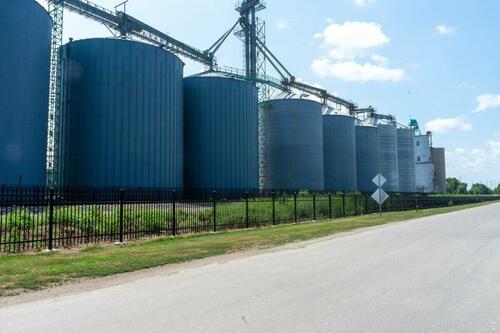Ukraine Grain Strain: Almost 25 Million Tonnes Blocked From Export
A massive backlog of grain shipments is piling up in Ukraine to the tune of nearly 25 million tonnes due to ‘infrastructure challenges’ and blocked ports in the Black Sea, including Mariupol, Reuters reports, citing a UN food agency official.’
Ukraine was the fourth-largest exporter of maize (corn) in the 2020/21 season, and the sixth-largest wheat exporter in the world, according to the International Grains Council.
“It’s an almost grotesque situation we see at the moment in Ukraine with nearly 25 mln tonnes of grain that could be exported but that cannot leave the country simply because of lack of infrastructure, the blockade of the ports,” said FAO Deputy Director Josef Schmidhuber during a Geneva press briefing via Zoom.
According to Schmidhuber, the full silos could result in storage shortages for this year’s July and August harvests.
“Despite the war the harvest conditions don’t look that dire. That could really mean there’s not enough storage capacity in Ukraine, particularly if there’s no wheat corridor opening up for export from Ukraine.”
He alluded to destroyed grain storage as a result of the Russian invasion, without elaborating.
CNN, however, reports from ‘multiple sources’ that Russian forces have allegedly plundered farm equipment and hundreds of thousands of tonnes of grains from Ukraine, with the Ministry of Defense estimating on Thursday that 400,000 tonnes of grain had been stolen to date.
[And given the source(s), the usual ‘grain of salt’ disclaimer applies as to the extent and accuracy of claims.]
Oleg Nivievskyi at the Kyiv School of Economics told CNN the thefts of farm equipment, such as tractors and harvesters, by Russian forces have been absolutely devastating for Ukrainian farmers.
“Even if these regions are liberated tomorrow, it will take time to restart the production cycle,” perhaps two to three years. Buying fertilizer and equipment and hiring workers would be tough for farmers who have been cleaned out by the Russians — because their grain is their working capital for the next season,” Nivievskyi said.
Footage has been posted online of long Russian convoys of farm equipment on flat-bed trucks leaving Melitopol, a city in southeastern Ukraine.
Olga Trofimtseva, former agriculture minister in Ukraine, said farm equipment thefts were also seen in Donetsk and Kharkiv. “Their equipment was simply stolen and pulled across the border — new tractors, harvesters,” she said.
Prior to the invasion, there were 6 million tons of wheat and 15 million tons of corn ready for export.
Farmers in top growing areas in the southern part of the country, such as Kherson and Zaporizhzhia, have halted sowing operations due to the lack of farm equipment, shortage of diesel, fertilizer, and seed as the disruptions caused by the conflict.
CNN reported one instance where a large grain storage complex located in the eastern part of the country was bombed.
Russia has also reportedly intensified strikes on infrastructure, destroying highways, bridges, rail hubs, ports, electrical power stations, and fuel facilities, in a bid to disrupt the West’s shipments of weapons to resupply the Ukrainian Armed Forces.
The combination of thefts of tractors and grains, sowing disruptions, and blown-up ag facilities and infrastructure will severely impact food production in one of the world’s largest grain exporters.
Ukraine’s deputy agriculture minister Taras Vysotskiy said Thursday the country only has enough stocks to feed its population. This means that Ukraine might not be able to export grains to other countries. Even if farmers were to plant, damage to highways, ports, and rail systems could make the flow of farm goods out of the country near impossible.
The latest Food and Agriculture Organization of the United Nations report estimated a 20% decline in global wheat production this year due to the ongoing situation in Ukraine, where the Ministry of Agriculture recently warned a third of the country’s farmland is occupied or unsafe.
The worst of the global food crisis could still be ahead (well, at least the Rockefeller Foundations thinks so…) since the Northern Hemisphere planting season has only begun, and commodity traders will have a more accurate crop production estimate by summer, which may result in even higher food prices.
Tyler Durden
Sun, 05/08/2022 – 08:45
Zero Hedge’s mission is to widen the scope of financial, economic and political information available to the professional investing public, to skeptically examine and, where necessary, attack the flaccid institution that financial journalism has become, to liberate oppressed knowledge, to provide analysis uninhibited by political constraint and to facilitate information’s unending quest for freedom. Visit https://www.zerohedge.com


